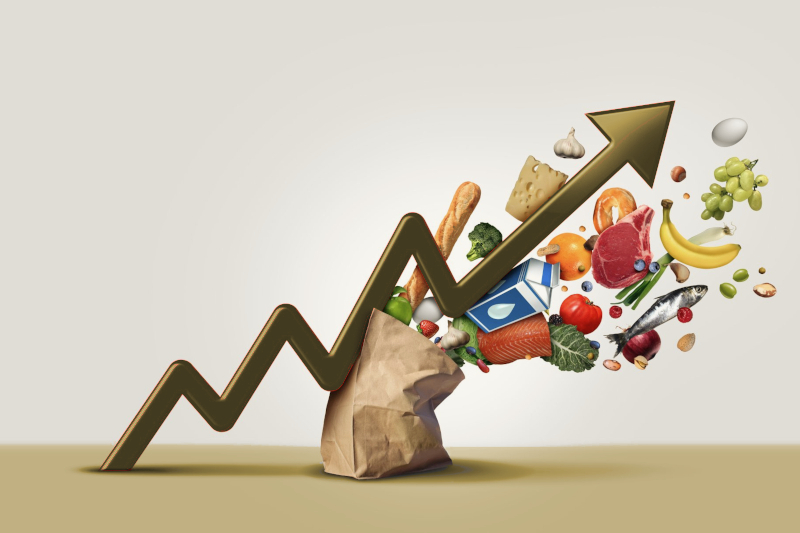
Greedflation, Shrinkflation & Skimpflation Explained
Greedflation, Shrinkflation & Skimpflation Explained
In the complex landscape of economic shifts, the impact of inflation goes beyond mere numbers on charts. Recent reports from news provider BELGA (10 Nov '23) highlight the financial strain faced by one in three Belgians, who currently allocate approximately 30% of their budget to food expenses. However, the ominous prospect looms that if the trend of rising living costs persists, a staggering 55% may find themselves compelled to make further cutbacks on essential food items.
The Emergence of Greedflation
In 2022, after a hiatus of more than a decade, high inflation made a comeback, sending ripples through the economic fabric. Initially, the public attributed this phenomenon to surging energy prices. However, as costs escalated across various sectors, certain consumers began to suspect that some companies were capitalizing on the situation by increasing prices far beyond the additional expenses they incurred. This gave rise to the term "greedflation".
The term itself implies more than just a general increase in prices. It conveys a sense of opportunism, where businesses seize the chance to maximize their profits under the guise of inflation. As consumers grapple with the rising cost of living, the added burden of "greedflation" exacerbates financial pressures.
Super-Shrinkflation Takes the Stage
As discussions unfolded about whether certain brands and supermarkets were guilty of "greedflation," a new term, "super-shrinkflation," entered the scene. This strategy, often executed with surgical precision, involves a two-step process that challenges consumers' perceptions of value.
In the first stage, packaging size and price remain constant, creating an illusion of stability. However, the contents within undergo a subtle reduction - a phenomenon known as "shrinkflation." The super-value pack that was once 600 grams now only contains 500 grams. This reduction often goes unnoticed... initially, as it is overshadowed by the apparent stability of the packaging. However, consumers soon find themselves grappling with the realization that they are receiving less for the same price.
Once consumers adjust to the reduced quantity, the second stage of the strategy kicks in - a price hike. This double whammy, combining reduced quantity and increased prices, has lead to the coining of another new term: "super-shrinkflation." The psychological impact of this strategy is profound, as consumers feel the pinch not just in their wallets but also in the diminishing tangible value of the products they purchase.
Unveiling Skimpflation
Consumers, however, face more challenges beyond super-shrinkflation. The food industry is now accused of employing a subtle tactic known as "skimpflation." This strategy goes beyond altering packaging or quantity; instead, it involves making slight modifications to product recipes. These alterations are often discreet: a reduction in the egg content in mayonnaise, a decrease in the number of olives in olive oil, or, in the case of businesses, a lowering of the quality of service.
Skimpflation, in essence, is a nuanced approach to cost-cutting. Companies seek to maintain the facade of unchanged products or services while subtly diminishing the quality or quantity. The impact is insidious, as consumers may not immediately recognize these subtle changes, and even if they do, they may struggle to articulate why the product or service seems less satisfactory.
Debates and Controversies
Debates, discussions and studies abound on whether terms like "greed-shrink-skimpflation" are mere exaggerations by the press or reflective of a broader economic trend. Critics argue that economic fluctuations are inherent, and these terms simply magnify commonplace practices. However, proponents argue that the amalgamation of these terms underscores a shift in business practices, where companies navigate inflationary periods not merely by adjusting prices but by strategically manipulating various facets of their products and services.
Regardless of the ongoing debates, one undeniable reality persists — consumers are feeling the impact on their wallets. As the cost of living rises and novel economic strategies emerge, one effective way for consumers to mitigate the adverse impact on their finances is by making their money work for them. Investment avenues, savings strategies and financial literacy become crucial tools in navigating the intricate terrain of modern economic challenges.
Beware of "Drinkflation"
For those who savor a Friday night glass of wine, a cautionary note adds to the myriad of challenges: rumors suggest that alcohol content in beverages could also be subject to reduction.
Yes, you guessed it — prepare for "drinkflation."
Strategies for Consumers Amid Economic Uncertainties
As consumers grapple with the multifaceted challenges of inflation, greedflation, super-shrinkflation and skimpflation, proactive measures are essential. Meticulous budgeting becomes a fundamental aspect of financial management, as creating a detailed budget that accounts for essential expenses, discretionary spending and savings allows individuals to track their financial health and identify areas where adjustments can be made.
Investing wisely is also a strategic approach to counter the impact of inflation. Diversifying investments across various asset classes, such as stocks, bonds, real estate and commodities, can mitigate risks and enhance the potential for returns. Seeking guidance from Monnet Capital's financial advisors can aid in crafting an investment portfolio tailored to individual risk tolerance and financial objectives.
Conclusion
In the ever-evolving landscape of economic trends and consumer challenges, informed decision-making becomes paramount. From the subtle shifts of skimpflation to the overt tactics of greedflation and super-shrinkflation, consumers must equip themselves with the tools needed to safeguard their financial well-being.
If you would like to discuss ways to combat the effects of inflationary tactics on your finances, complete the contact form at the foot of this article and a Monnet Capital financial advisor will be in touch. And remember, as you savor your favorite glass of wine on a Friday night, be aware of any changes in sweetness, acidity... or, most importantly, effect – as drinkflation may be at play!
Complimentary Financial Guides
Monnet Capital has produced a series of complimentary financial guides for you to download. In these guides you will find useful information on topics such as pensions, estate planning and investing. Like to know more?..



